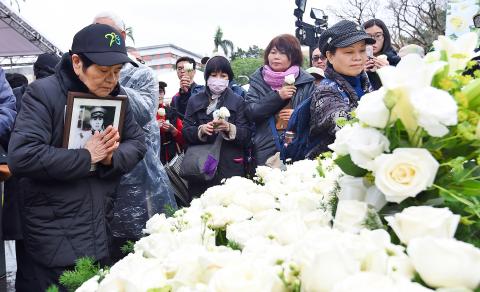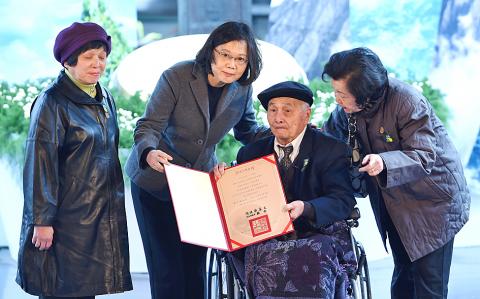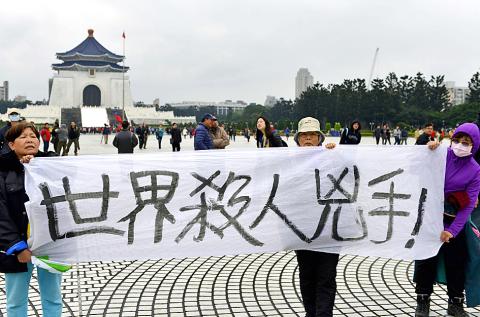President Tsai Ing-wen (蔡英文) yesterday pledged to clarify the attribution of responsibility for the 228 Incident in the most discreet manner possible, adding that she hoped future anniversaries of the tragic event could be marked by national unity.
Tsai made the remarks in her first speech on the 228 Incident as president, which was delivered at a memorial ceremony at the 228 Peace Memorial Park in Taipei on the 70th anniversary of the massacre.
“On Saturday last week, the Ministry of Culture proposed transforming the Chiang Kai-shek (蔣介石) Memorial Hall. This is the 70th anniversary of the 228 Incident and it is about time that changes are made. I believe Taiwan’s democracy is mature enough to have a discussion,” Tsai said.

Photo: Liu Hsin-de, Taipei Times
Reconciliation must be built upon truth, Tsai said, adding that the National Archives Administration would launch a new effort today to collect and organize documents concerning the Incident and the White Terror era that have been scattered across different government agencies.
Tsai said the results of the effort would provide the foundation for the government to compile a national investigative report on transitional justice, which would dedicate an entire section to the Incident.
“However, I must stress that we will adopt the most discreet attitude when dealing with the attribution of responsibility for the 228 Incident,” the president said.

Photo: Liu Hsin-de, Taipei Times
The 228 Incident refers to a crackdown launched by the then-Chinese Nationalist Party (KMT) regime against civilian demonstrations following an incident in Taipei on Feb. 27, 1947.
The ensuing massacre and imposition of martial law marked the beginning of the decades-long White Terror era, during which thousands of Taiwanese were arrested, imprisoned and executed.
Bereaved families have long lamented the government’s failure to officially identify the main culprit responsible for the massacre.

Photo: AFP
Shrugging off criticism that the economy should take precedence over transitional justice, Tsai said that economic growth and social justice are equally important and the goal should be pursuing both.
Tsai concluded her speech by expressing the hope that the realization of transitional justice would free all political parties from the past authoritarian baggage, ensure the recovery of truth, facilitate reconciliation between the victims and the perpetrators and remove traditional political taboos.
“I also hope that the draft transitional justice promotion bill will clear the legislative floor in the current legislative session … so that we can have an independent agency responsible for promoting transitional justice,” Tsai said.
Hsueh Hua-yuan (薛化元), chairman of the 228 Memorial Foundation, said that the victims’ families have been longing for the truth and identification of responsible parties.
“As far as the foundation is concerned, finishing the transitional justice report to prevent history from being repeated is the most crucial and fundamental purpose of transitional justice,” Hsueh said.
The commemorative ceremony, despite being briefly interrupted by protests, also saw the president hand out certificates of good character to a number of victims of the 228 Incident or their families to restore their reputations.

A magnitude 7.0 earthquake struck off Yilan at 11:05pm yesterday, the Central Weather Administration (CWA) said. The epicenter was located at sea, about 32.3km east of Yilan County Hall, at a depth of 72.8km, CWA data showed There were no immediate reports of damage. The intensity of the quake, which gauges the actual effect of a seismic event, measured 4 in Yilan County area on Taiwan’s seven-tier intensity scale, the data showed. It measured 4 in other parts of eastern, northern and central Taiwan as well as Tainan, and 3 in Kaohsiung and Pingtung County, and 2 in Lienchiang and Penghu counties and 1

FOREIGN INTERFERENCE: Beijing would likely intensify public opinion warfare in next year’s local elections to prevent Lai from getting re-elected, the ‘Yomiuri Shimbun’ said Internal documents from a Chinese artificial intelligence (AI) company indicated that China has been using the technology to intervene in foreign elections, including propaganda targeting Taiwan’s local elections next year and presidential elections in 2028, a Japanese newspaper reported yesterday. The Institute of National Security of Vanderbilt University obtained nearly 400 pages of documents from GoLaxy, a company with ties to the Chinese government, and found evidence that it had apparently deployed sophisticated, AI-driven propaganda campaigns in Hong Kong and Taiwan to shape public opinion, the Yomiuri Shimbun reported. GoLaxy provides insights, situation analysis and public opinion-shaping technology by conducting network surveillance

Taiwan is gearing up to celebrate the New Year at events across the country, headlined by the annual countdown and Taipei 101 fireworks display at midnight. Many of the events are to be livesteamed online. See below for lineups and links: Taipei Taipei’s New Year’s Party 2026 is to begin at 7pm and run until 1am, with the theme “Sailing to the Future.” South Korean girl group KARA is headlining the concert at Taipei City Hall Plaza, with additional performances by Amber An (安心亞), Nick Chou (周湯豪), hip-hop trio Nine One One (玖壹壹), Bii (畢書盡), girl group Genblue (幻藍小熊) and more. The festivities are to

AFTERMATH: The Taipei City Government said it received 39 minor incident reports including gas leaks, water leaks and outages, and a damaged traffic signal A magnitude 7.0 earthquake struck off Taiwan’s northeastern coast late on Saturday, producing only two major aftershocks as of yesterday noon, the Central Weather Administration (CWA) said. The limited aftershocks contrast with last year’s major earthquake in Hualien County, as Saturday’s earthquake occurred at a greater depth in a subduction zone. Saturday’s earthquake struck at 11:05pm, with its hypocenter about 32.3km east of Yilan County Hall, at a depth of 72.8km. Shaking was felt in 17 administrative regions north of Tainan and in eastern Taiwan, reaching intensity level 4 on Taiwan’s seven-tier seismic scale, the CWA said. In Hualien, the